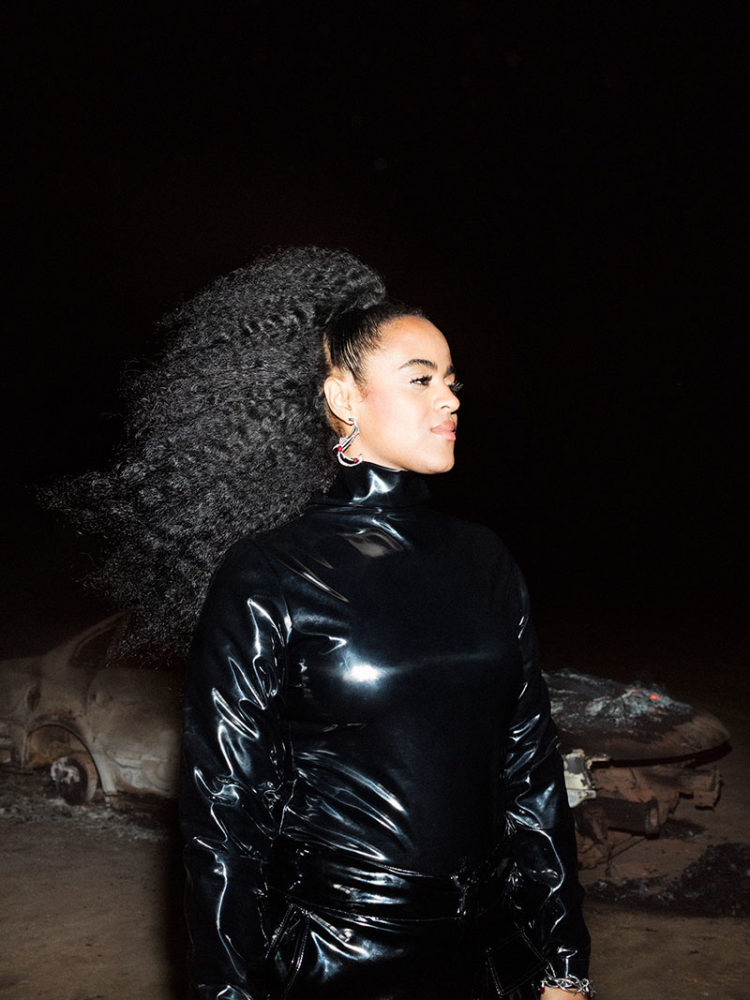Of Swedish and Gambian descent, singer Seinabo Sey, is steadily building a movement that transcends and transforms popular culture through her challenging approach to music. In her songs, the 27-year-old explores issues of self-esteem and self-identity through her own highly personalized lens. We recently caught up with Seinabo to discuss living off of being a creative talent, owning her womanhood, and the hype surrounding her recent track “I Owe You Nothing.”
You are a young soul pop singer with a ‘big room’ voice in the leagues of some of the greats. How did you arrive at this point in your life?
I’ve always been kind of different, so I think I was signed on that basis. Being different hasn’t been the hardest part of being in the industry. People are pretty okay with me doing whatever I want to do. Of course, I’ve had hardships along the way. I think I was preoccupied with getting people’s validation and as soon as I let go of that, I started to really take ownership of what I do and just keep pushing through. The last year or so, I’ve stopped caring what other people think. It’s been really scary and lonely, because you know, people will look at you crazy sometimes.
Your music feels very of-the-moment and yet refreshingly timeless. For example “Younger.” Tell me about that.
I had a kind of writer’s block I guess I would say. I had come into contact with industry professionals for the first time and I was so intimidated but somehow I just sat down and wrote it.
Tell me about your latest track “I Owe You Nothing.”
That came from me being in the music industry for a while now. And realizing that people want young women to present a certain picture, and do the same thing over and over again. I just got to a point where I was so tired of that. That’s where the anger came from to write that song. I just want to learn and grow – whether the song is successful or not – I just want to make good music.
Tell me about the Östergårdsskolans music program in Halmstad, Sweden for musically gifted teenagers.
I think I was bullied in my old school – I can’t really remember it that well – and my mom, I think that was her solution to get me into a new school. So she found this music school and she knew I liked singing. I had to a little test, I think I was like 10 years old, and I got in. We sang a lot of old pop songs in the choir and I was always kind of odd out because I had a really low voice. It was in a really small town and there weren’t many black people there so it was a pretty isolated time in my life. But it made my imagination really flourish, because I spent a lot of time walking around and thinking, and I think that led to me becoming a singer.
Your lyrics are challenging and sometimes abstract. Do you write your songs from personal experiences?
I wish I knew more about my creative process but I really don’t. The songs just come to me. I just have to be actively writing songs and they come to me, and when I stop writing, they don’t. Oftentimes, I really need to be in a happy place because that thinking of artists being better when they’re sad, I don’t agree with that.
Talk about your videos, namely “Pretend,” from the eponymous album, about uniquely owning your femininity and sexuality in an oversaturated market. What has been the industry’s response?
I think its been good. I try not to think about it too much. I’m very much where I am in my head and I’m also kind of in the future with things so I don’t really think about feedback. But I guess people are inspired and that’s all I can really ask for, that they want to listen to my music. I’m just happy to be creating work that I’m proud of, that I’m going to be happy to watch again when I’m older.
Who directed the new videos?
The director is for the three new videos, Sheila Johansson, a young Swedish woman. She’s really great.
Your father, Maudo Sey, was a renowned musician in Gambia and Senegal. What did you learn from him and who are some Gambian artists you respect or admire?
I think Youssou N’Dour is probably my favorite out of all of the Senegalese singers that I’ve been listening to my whole life. Just now, when I went to Gambia, I started to listen and realize how much I love the musicians there.
Who’s on your list that you’d like to collaborate with?
I have so many people that I really really like. There’s an American singer called Sperpentwithfeet that I think is beautiful. A musician named Kindness that is really great. There are a lot of people that I admire and adore. This guy called Petit Noir, I think he’s based in London. Kojey Radical, a London-based rapper, who’s amazing.
What has been one of your personal highlights so far?
That’s a good question. Some highlights have been on stage, some really wonderful ones. I did a festival called Way Out West in Gothenburg, Sweden, which was awesome. Buying myself an apartment has been a big personal goal for me. I’ve never had one before. And just being able to live off of being a creative person, keeping life going…I’m happy about that.


